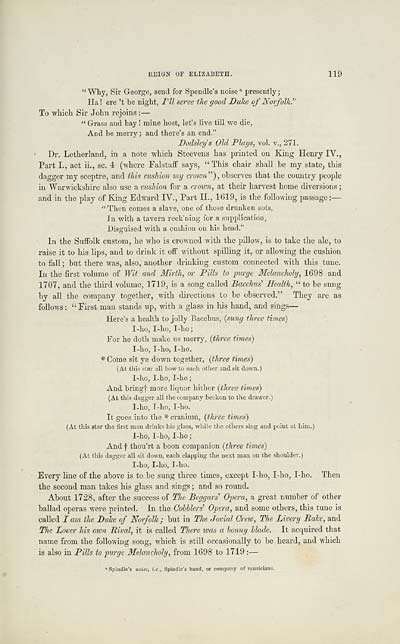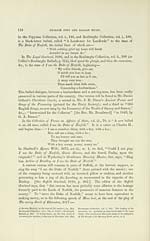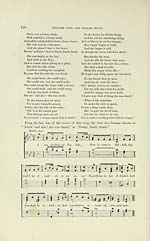Glen Collection of printed music > Printed text > Popular music of the olden time > Volume 1
(153) Page 119
Download files
Complete book:
Individual page:
Thumbnail gallery: Grid view | List view

EEIGN OF ELIZABETH. 119
" Why, Sir George, send for Spendle's noise ^ presently ;
Ha ! ere 't be niglit, Til serve the good Duke of Norfolk."
To -which Sir John rejoins : —
" Grass and hay I mine host, let's live till we die,
And be merry ; and there's an end."
Dodsley's Old Plays, vol. v., 271.
Dr. Letherland, in a note -which Steevens has printed on King Henry FV.,
Part I., act ii., sc. 4 (-where Falstaff says, "This chair shall be my state, this
dagger my sceptre, and this cushion my crown"), observes that the country people
in Warwickshire also use a cushion for a crown, at their harvest home diversions ;
and in the play of King Ed-ward IV., Part II., 1619, is the following passage : —
" Then comes a slave, one of those drunken sots.
In -with a tavern reck'ning for a supplication,
Disguised with a cushion on his head."
In the Suffolk custom, he who is cro-wned with the pillow, is to take the ale, to
raise it to his lips, and to drink it off without spilling it, or allowing the cushion
to fall ; but there was, also, another drinking custom connected with this tune.
In the first volume of Wit and Mirth, or Pills to purge Melancholy, 1698 and
1707, and the third volume, 1719, is a song called Bacchus' Health, " to be sung
by all the company together, with directions to be observed." They are as
follows : " First man stands up, with a glass in his hand, and sings —
Here's a health to jolly Bacchus, {sung three tiines)
I-ho, I-ho, I-ho ;
For he doth make us merry, (three times)
I-ho, I-ho, I-ho.
*• Come sit ye down together, {three times)
(At this star all bow to each other and sit down.)
I-ho, I-ho, I-ho ;
And bringf more liquor hither {three times)
(At tliis dagger all the company beckon to the drawer.)
I-ho, I-ho, I-ho.
It goes into the ■* cranium, {three times)
(At this star the first man drinks his glass, while the others eing and point at him.)
I-ho, I-ho, I-ho ;
And f thou'rt a boon companion {three times)
(At this dagger all sit down, each clapping the next man on the shoulder.)
I-ho, I-ho, I-ho.
Every line of the above is to be sung three times, except I-ho, I-ho, I-ho. Then
the second man takes his glass and sings ; and so round.
About 1728, after the success of Tlie Beggars' Opera, a great number of other
ballad operas were printed. In the Cobblers' Opera, and some others, this tune is
called I am the Biike of Norfolk ; but in The Jovial Grew, The Livery Make, and
The Lover his own Rival, it is called There ivas a bonny blade. It acquired that
name from the following song, which is still occasionally to be heard, and which
is also in Pills to purge Melancholy, from 1698 to 1719 : —
'^ Spindle's noise, i.e.. Spindle's band, or company of musicians.
" Why, Sir George, send for Spendle's noise ^ presently ;
Ha ! ere 't be niglit, Til serve the good Duke of Norfolk."
To -which Sir John rejoins : —
" Grass and hay I mine host, let's live till we die,
And be merry ; and there's an end."
Dodsley's Old Plays, vol. v., 271.
Dr. Letherland, in a note -which Steevens has printed on King Henry FV.,
Part I., act ii., sc. 4 (-where Falstaff says, "This chair shall be my state, this
dagger my sceptre, and this cushion my crown"), observes that the country people
in Warwickshire also use a cushion for a crown, at their harvest home diversions ;
and in the play of King Ed-ward IV., Part II., 1619, is the following passage : —
" Then comes a slave, one of those drunken sots.
In -with a tavern reck'ning for a supplication,
Disguised with a cushion on his head."
In the Suffolk custom, he who is cro-wned with the pillow, is to take the ale, to
raise it to his lips, and to drink it off without spilling it, or allowing the cushion
to fall ; but there was, also, another drinking custom connected with this tune.
In the first volume of Wit and Mirth, or Pills to purge Melancholy, 1698 and
1707, and the third volume, 1719, is a song called Bacchus' Health, " to be sung
by all the company together, with directions to be observed." They are as
follows : " First man stands up, with a glass in his hand, and sings —
Here's a health to jolly Bacchus, {sung three tiines)
I-ho, I-ho, I-ho ;
For he doth make us merry, (three times)
I-ho, I-ho, I-ho.
*• Come sit ye down together, {three times)
(At this star all bow to each other and sit down.)
I-ho, I-ho, I-ho ;
And bringf more liquor hither {three times)
(At tliis dagger all the company beckon to the drawer.)
I-ho, I-ho, I-ho.
It goes into the ■* cranium, {three times)
(At this star the first man drinks his glass, while the others eing and point at him.)
I-ho, I-ho, I-ho ;
And f thou'rt a boon companion {three times)
(At this dagger all sit down, each clapping the next man on the shoulder.)
I-ho, I-ho, I-ho.
Every line of the above is to be sung three times, except I-ho, I-ho, I-ho. Then
the second man takes his glass and sings ; and so round.
About 1728, after the success of Tlie Beggars' Opera, a great number of other
ballad operas were printed. In the Cobblers' Opera, and some others, this tune is
called I am the Biike of Norfolk ; but in The Jovial Grew, The Livery Make, and
The Lover his own Rival, it is called There ivas a bonny blade. It acquired that
name from the following song, which is still occasionally to be heard, and which
is also in Pills to purge Melancholy, from 1698 to 1719 : —
'^ Spindle's noise, i.e.. Spindle's band, or company of musicians.
Set display mode to: Large image | Transcription
Images and transcriptions on this page, including medium image downloads, may be used under the Creative Commons Attribution 4.0 International Licence unless otherwise stated. ![]()
| Special collections of printed music > Glen Collection of printed music > Printed text > Popular music of the olden time > Volume 1 > (153) Page 119 |
|---|
| Permanent URL | https://digital.nls.uk/91369283 |
|---|
| Shelfmark | Glen.254 |
|---|---|
| Additional NLS resources: | |
| Attribution and copyright: |
|
| Description | Scottish songs and music of the 18th and early 19th centuries, including music for the Highland bagpipe. These are selected items from the collection of John Glen (1833 to 1904). Also includes a few manuscripts, some treatises, and other books on the subject. |
|---|
| Description | The Glen Collection and the Inglis Collection represent mainly 18th and 19th century Scottish music, including Scottish songs. The collections of Berlioz and Verdi collected by bibliographer Cecil Hopkinson contain contemporary and later editions of the works of the two composers Berlioz and Verdi. |
|---|

